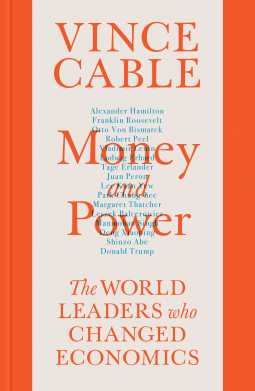
Money and Power
The World Leaders Who Changed Economics
by Vince Cable
This title was previously available on NetGalley and is now archived.
Send NetGalley books directly to your Kindle or Kindle app
1
To read on a Kindle or Kindle app, please add kindle@netgalley.com as an approved email address to receive files in your Amazon account. Click here for step-by-step instructions.
2
Also find your Kindle email address within your Amazon account, and enter it here.
Pub Date 4 May 2021 | Archive Date 12 Jan 2021
Talking about this book? Use #MoneyandPower #NetGalley. More hashtag tips!
Description
Advance Praise
'Vince Cable brings economics to life in this thrilling history, revealing how 16 leading politicians over the last 250 years have used it in their own totally different ways to make the world anew.' - Sir Anthony Seldon, author of May at 10
'A wonderful journey through the economic ideas that have shaped leading politicians throughout history.' - Dame Minouche Shafik, Director of LSE
'From Hamilton and Lenin to Abe and Trump, these brilliant essays are true to the dictum that 'people don't believe in ideas, they believe in people who believe in ideas'. This is a book which will change the way you think about politics and the leaders and ideas which have driven it forward in the last three centuries.' - Lord Andrew Adonis
'Vince Cable brings out with spectacular clarity how important and radical leaders end up combining economic theory, political ideology and practical administration. This book needs to be read by anyone who is interested in how the world's economies are really run.' - Sir Oliver Letwin
'Money and Power provides a masterly analysis of how economic policy has determined the success and failure of political leaders through the ages.' Vicky Pryce, former Joint Head of the UK Government Economic Service
Available Editions
| EDITION | Other Format |
| ISBN | 9781786495105 |
| PRICE | US$32.95 (USD) |
Featured Reviews
 Reviewer 703837
Reviewer 703837
This fascinating book presents profiles of 16 world leaders who have had a broad impact on we understand the impact of economic theory on political situations. Each leader is given about 20 pages with a bit of biography, consideration of the situation they faced, what they did, how it went and the broader legacy they left. Cable writes with real clarity, summarising complex situations and economic theories in an accessible way. It makes a very enjoyable and informative read.
The value of the book is in the choice of the leaders and the quality of the writing and analysis. Here the selection is really diverse and wide-ranging, running from Alexander Hamilton to Trump, via Bismarck, post-war Germany, Argentina and Sweden, the Asian miracles (South Korea, Singapore), post-Mao China, Thatcherism, post-Communist Poland, and recession hit Japan. He evaluates the achievements in an even-handed way, always trying to sift the good from bad and to giver a fair hearing to supporters and critics, even for a leader like Trump, who is clearly not Cable's cup of tea.
Some of these stories I knew and some I didn't but the sequence of leaders and policies generates its own bigger story, broadly tracing an arc from development economics, opening out to the wider economy and ensuring the stable growth that raises living standards. There is a good mix of global regions and the consideration of both developed and developing economies,
Naturally, the author’s own Liberal agenda comes across: free markets are good and some central direction and pace-setting are also ok, if done to raise living standards and increase competitive vitality. Creating an educational and transport infrastructure are important but he is a bit dubious about attempts to blur economics with morality (Lee Kuan Yew, Margaret Thatcher, and Xi Jinping all lose marks for this). Anything like protectionism, corporate cartels, price controls, natural monopolies, or cronyism are bad. His 16 leaders mainly tend to be those who dismantled barriers, tariffs, and state corporations while also keep an eye on money supply to control interest rates, but he does include those, like Peron and Trump, who did the opposite.








